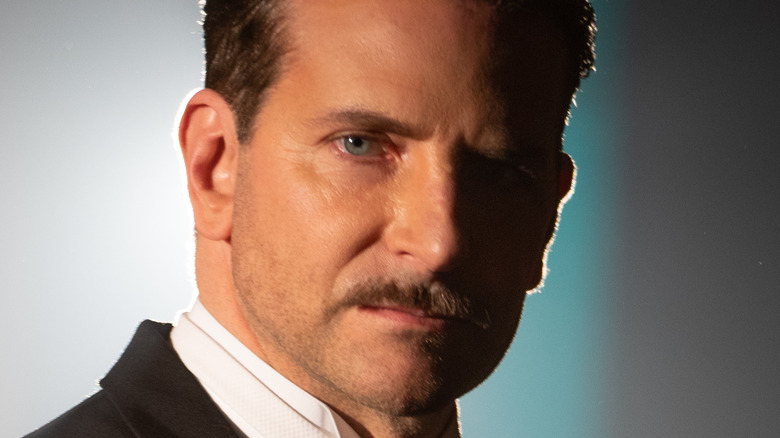The Surprising Connection Between Guillermo Del Toro And Bradley Cooper's Character In Nightmare Alley
In "Nightmare Alley," the new neo-noir thriller from director Guillermo del Toro (who also co-wrote the script with Kim Morgan), Bradley Cooper plays Stanton Carlisle, a drifter and grifter with a treacherous past who stumbles into a traveling carnival in 1939 and soon ingratiates himself with the boss (Willem Dafoe) and the other carny workers.
There, Stanton becomes entwined with Zeena the Seer (Toni Collette) and her dissolute companion Pete (David Strathairn), who at one point had a mentalist act that captivated and utterly fooled audiences. Through a combination of luck, tragedy, and malevolent cunning, Stanton becomes the custodian of the act's secrets. He leaves the carny behind, with innocent lover Molly (Rooney Mara) in tow, to launch a new mentalist grift for the wealthy elites of Buffalo, New York, only to find that his soul and life are in mortal danger from others who are even more ruthless.
Stanton is ambitious — perhaps fatally so — and his avenue to wealth and fame is illusion: providing fantastical yet false narratives to snare large audiences and private clients alike.
In a weird way, he's a dark mirror image of what a filmmaker like del Toro himself does: create stories out of the imagination and with the help of perhaps a few "parlor tricks." That's an aspect of this multi-layered film that the director addressed in a press conference for "Nightmare Alley" attended by Looper. "These are questions that are very real for me as a storyteller," he mused. "And I think that ... I have tried to be cautious in my own life about understanding that."
What success means to Guillermo Del Toro
For Stanton, success is measured in terms of pure greed and revenge — he spins his web of deceit around both the souls struggling at the bottom of the ladder and the power brokers gathered at society's upper echelons. The money is part of it, but arguably the bigger factor is the satisfaction he derives from fooling one mark after another.
"I find the notion of success incredibly tortuous," says del Toro about his own gauge for what it means to be accomplished in one's chosen profession. "As an artist, I've come to the definition that success is f***ing up on your own terms. That's basically it. It's not about how people praise what you do, but how you feel that you're expressing what you are. That took a while to figure out, and I find the American dream an incredible generator of nightmares."
Del Toro also says there's a key difference between the kind of storytelling he does and the false narratives that Stanton Carlisle weaves for his customers — an artist will always strive to include some sort of truth about themselves or the world around them in their work, in the hope that it touches a chord in the audience. Stanton doesn't care about any of that.
"The movie reflects a character that is two steps away from losing everything the whole movie, because he's absolutely made of lies," he explains. "He's not shielded by the truth about himself or others, so he is always in danger. He's fraught. And I think you try to bring some form of truth to what you do, and not think of career, for example, but think about just staying loyal to what you want to tell."
"Nightmare Alley" opens in theaters on December 17.

